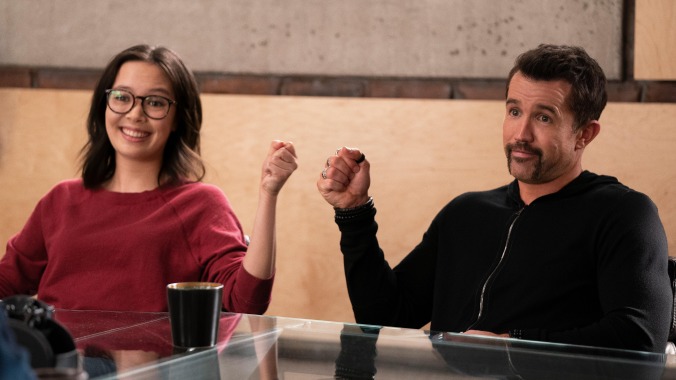Mythic Quest season 2 foregrounds one of TV’s most intimate platonic relationships


Mythic Quest can be a cruel show. Not cruel in the same way that It’s Always Sunny In Philadelphia—with which it shares two stars, several executive producers, and some measure of its assholes-talk-over-each-other comic sensibility—can be cruel, with awful things happening to worse people, for fun. No, as one of the most consistently thoughtful shows currently being made about the creative process that also happens to feature awful people doing fairly awful things to each other on a semi-regular basis, for fun, Mythic Quest excels at finding deeper and nastier ways at cutting its cast, and its fans, to their cores.
It’s to that end that the show’s second season picks up right where its first (and two excellent, pandemic-themed inter-season episodes) left off, as visionary game designer Ian Grimm (Rob McElhenney) and long-suffering chief engineer Poppy Li (Charlotte Nicdao) try to figure out how to share authority in the wake of Ian promoting Poppy to be his equal on their massively successful online game. The clash between two titanic egos—smooth-talking ideas guy Ian on one hand, technical perfectionist Poppy on the other—produces the typical over-blown shouting matches, mutual accusations of “cancellation,” and occasional tortured divorce metaphors that you might expect. But it also allows Nicdao and McElhenney to make liberal use of Mythic Quest’s secret weapon: A willingness to let shocking amounts of vulnerability and intimacy slip in between its two leads, blowing through its usual “Who can say the meanest funny thing to the other character?” comedy haze.
Rest assured, though: Mythic Quest has no interest in indulging in rote will-they/won’t they plots, despite a running joke that almost everyone in the MQ offices has had a sex dream about Ian at one point or another. Instead, Poppy and Ian’s frequent bouts of fight or flight stem from a tension that runs far closer to the show’s true heart. Because even as it puts its focus on an industry where money, above all else, is king, Mythic Quest carries a deep love for those weirdos who simply can’t bring themselves to not create, the obsessive dreamers who push on making their thing in the face of failure, discouragement, and even an occasional total lack of talent. That obsession is at the heart of much of the show’s cruelty. Among other things, it’s the bond that keeps Poppy and Ian locked in a tight enough orbit to be constantly at each other’s throats. But it’s also the shared understanding that allows those moments of suddenly shocking connection to land as hard as they do. It’s a magic trick that should wear out its welcome eventually—McElhenney has understood the power of letting an actual human being shine through his veneer of self-important, deluded buffoonery for years—and yet it just keeps working, powered by a pair of performers whose capacity to veer from absurd to authentic continues to impress.
Things get messier, though, when that ethos is applied to the show’s more cartoonish secondary cast. Mythic Quest can be applauded for trying to find some humanity in a character like Danny Pudi’s delightfully villainous money guy Brad, or F. Murray Abraham’s resident writer C.W. Longbottom, a character who existed in the first season primarily to set up a long series of “old man says least appropriate thing imaginable” gags. But not every character can support this kind of hard-focus treatment, and the show’s efforts to mine pathos from C.W.—including a full-episode flashback clearly attempting to recapture the power of the first season’s beautiful stand-alone “A Dark Quiet Death”—end up breaking up the momentum of the season’s existing tale, even as they add in context and some admittedly high-comedy moments. Better served are Ashly Burch and Imani Hakim’s QA testers, Rachel and Dana, who manage to have a legitimately affecting love story amid all the higher-order drama, and David Hornsby’s cheerfully unambitious producer David, still channeling Rickety Cricket as the universe’s favorite person to consistently kick in the teeth. (That’s to say nothing of Jessie Ennis as megalomaniacal assistant Jo, still Mythic Quest’s single best instrument for injecting high-chaos comedy into a scene.)
And if all of this reads a bit like an assessment of an hour-long drama, rather than a half-hour comedy with dick jokes, well, you can attribute that to the show’s frequent willingness to take a serious swing to fill out its weekly run time. But the dick jokes are there, and are still excellent, often delivered via winning-if-smaller performances from the likes of Derek Waters, Caitlin McGee, and Naomi Ekperigin. (Aparna Nancherla’s acerbic Michelle is absent, though, and sorely missed.) Meanwhile, if the show’s comedy this season is rooted more firmly in its characters than in the nuts and bolts of game development, it’s hard to fault Mythic Quest for playing to its strengths—even if anyone familiar with the actual ins and outs of the industry can’t help but still cringe sympathetically at some of its drive-by gags, like the knowing runner about the game’s art team being worked far past the point of exhaustion to meet their bosses’ constantly shifting demands.
Above all, though, Mythic Quest reminds us of how wonderful it can be to dip back into a comedy series that has so much to say about, and so much passion for, its actual subject matter. It might take some knowing pokes at the “workplace as family” themes that have been infiltrating TV comedy for decades, but Mythic Quest never loses sight of the fact that it’s a show about people whose lives, for good or ill, revolve around making a thing. Its characters are obsessive, petty, obnoxious, and frequently just plain shitty to each other. But it’s always in pursuit of making their shared “baby” the best that it can be, and that grounding in (admittedly skewed) reality is what allows the series to take its biggest and most successful swings, whichever way on the “comedy vs. drama” pendulum they go.